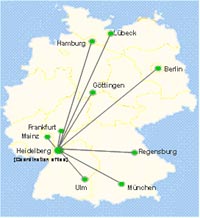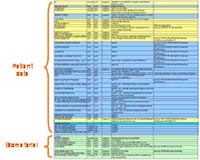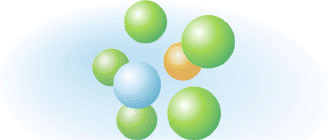Introduction
The initial funding period of the National Genome Research Network (NGFN) was focused on site specific funding of genomic research. In the second phase of funding (NGFN-2) the network character has been established more pronounced. In NGFN-2 it became possible to establish central coordinating structures within the subnets of NGFN-2. Experience from other Research Networks had shown that a central coordination facility was often correlated with a more effective and successful work. A coordinating office (CO) supports the coordinator and speaker, prepares scientific and administrative sessions and meetings, coordinates the information flow between the scientific subprojects and the funding organization etc. The Herz-Kreislauf-Netz has jumped at this chance and established a CO as a single subproject at the site of the speaker and coordinator.
After hiring a scientific coordinator and CEO in summer 2004 the CO was established and technically equipped in the first months of NGFN-2 in Heidelberg. A secretary has been hired in early 2005. The work package of the CO had already be defined in the NGFN-2 application of NGFN-2:
- build up a effective communication structure
- maintain the information flow between the subprojects
- keep close contact to the funding organisation (BMBF, DLR) and project management
- organize scientific meetings and workshops
- establish a special website for scientists and patients
- maintain and optimize the Task force data base
- take care for all kinds of public relation
- build up contacts to international partners
- reports to the funding organizations
- controling of the financial
Results/Project Status
Corporate design
One of the first activities of the CO was the development of a clearly defined corporate design (CD) for the Herz-Kreislauf-Netz. A CD is not only important for fashion or IT companies but also for scientific research networks. It is an important goal of the funding Ministry of Education and Science in Germany (BMBF) to make the scientific work clearly visible
.gif)
in the public. Therefore the development of a CD was one of the first challenges for the CO. At first the German name “Herz-Kreislauf-Netz” (“cardiovascular diseases network”) had been agreed by the steering committee. The second step was the development of a logo which includes the cardiovascular research as well as the genomic approach in a visually aesthetic way. In view of many hundred logos of cardiovascular research organisations it was quite difficult to find a unique and appealing design. Unfortunately a pure visual log could not be realized because it is not self explaining. Normally new visual logos must be circularized by huge and expensive PR campaigns. Against this background the logo had to be combined with the name “Herz-Kreislauf-Netz”. To prevent unauthorized use of the logo it was protected by paten rights EU wide.

Website
The development of a modern website was already part of the application of the Herz-Kreislauf-Netz. The speaker and coordinator was aware that the result of genomic research could not be hidden in the scientific community but had to be circularized into the public. One of the best and most economic ways to give a global access to the scientific data is the internet. Based on the name “Herz-Kreislauf-Netz first several URL`s and top level domains was allocated. The same has been done for the English translation (Cardiovascular diseases Network). A website for a dynamic process like genomic research requires permanent and immediate updating. A static HTML based website did not comply with these requirements. So it was necessary to use a content management system (CMS) which is easy and fast to maintain. The template for the website was designed using the corporate design of the Herz-Kreislauf-Netz and all scientific projects where represented as well as numerous hyperlinks and current informations.
Apart from the website the CO has developed master backgrounds for powerpoint and poster presentations, business cards, letterheads etc. to complete the corporate design elements.
Data base Herz-Kreislauf-Netz
The analysis of the genetic background of cardiovascular diseases requires lots of patient data and biomaterial to associate genetic and phenotypic data. Moreover, sometimes special phenotypes or age and gender matched cohorts where needed to answer scientific questions. Unfortunately even large university hospitals only have a limited portfolio on phenotypic and genetic data. Therefore the “Task force data base” in the Herz-Kreislauf-Netz has been established already in the first funding period of NGFN. This data base contains only a limited number of pseudonymized patient data and clinical parameters to allow the network partners the identification of interesting patients at the different sites of the network. For data protection the

cooperation partners agree to select only those patients which have signed a informed consent form, respectively. The data base itself requires a password access which will be granted only to a small number of cooperation partners. The great advantage of the data base is to give scientists a simple and fast overview of available patient data and biomaterial (blood, DNA). In case of special interest a researcher gets in contact with the data owner. The data owner and the interested party agrees a individual contract to share the data and / or biomaterial for scientific research. There will be signed a special contract between the cooperation partners within the network to guarantee that certain conditions on data security, non profit use etc. will not be violated by the parties.
The great advantage of this type of data base is the optimal use of all data and biomaterials which are available within the whole Herz-Kreislauf-Netz. Normally the partners have only none or very limited knowledge about the individual data bases of the cooperation partners.
Outlook
At the moment six partners cooperate in this project:
University hospitals:
University of Heidelberg – Cardiology
University of LMU Munich – Cardiology
University of Göttingen - Cardiology
University Schleswig Holstein, Campus Kiel – Cardiology
University of Regensburg – Cardiology
Population genetics platforms:
popgen, Kiel
KORA, GSF Neuherberg
Because of the portfolio of these partners the critical mass of content is already reached. It is assumed that after complete implementation of all available data this data base will bring a pronounced increase in mutual exchange of data and biomaterial within the network. Optimally additional partners will share this project in the near future. A discussion process is ongoing to adopt this concept of a “data showroom” for the NGFN as a whole.
Lit. 1. www.herz-kreislauf-netz.com
2. http://med1.klinikum.uni-muenchen.de/index.htm
3. http://www.herzzentrum.med.uni-goettingen.de
4. www.innere2.mu-luebeck.de
5 .http://www.uni-regensburg.de/Fakultaeten/Medizin/
Innere_2/index.htm
6. www.popgen.de
7. www.gsf.de/kora
8. www.gsf.de/koragen


